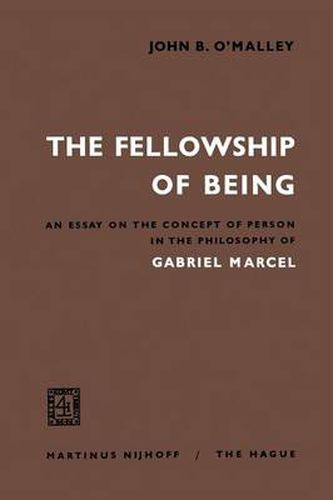Readings Newsletter
Become a Readings Member to make your shopping experience even easier.
Sign in or sign up for free!
You’re not far away from qualifying for FREE standard shipping within Australia
You’ve qualified for FREE standard shipping within Australia
The cart is loading…






This title is printed to order. This book may have been self-published. If so, we cannot guarantee the quality of the content. In the main most books will have gone through the editing process however some may not. We therefore suggest that you be aware of this before ordering this book. If in doubt check either the author or publisher’s details as we are unable to accept any returns unless they are faulty. Please contact us if you have any questions.
This book is the fruit of a critical inquiry into the nature and scope of Marcel’s philosophie achievement. As such, it is concerned less with affixing the appropriate label (personalist or existentialist) to Marcel’s thought -and with it making it stick - than with discovering the precise impulse and tenor ofhis philosophy. In the process ofthat more general inquiry, the writer found being forced upon hirn a central concept as integrating focus of Marcel’s philosophie investigations. This eoneept was that of the person. Gradually it emerged as a concept not only of prime importance for understanding the underlying harmony that pervades Marcel’s professedly unsystematic researches, but equally as one of profound significanee for any philosophy that pretends adequately to aecount for human experienee. Furthermore, it seemed that the eoneept derived much ofthat significance from its acceptance precisely in the context of Marcel’s thought. This feature ofMareel’s philosophie writings alone is warrant enough for overeoming any initial embarrassment aroused in Anglo-Saxon breasts by his style. For, to speak candidly, that style is of a generation and a climate whose tastes little aecord with palates trained to a greater astringeney. Nor will Marcel’s evident and unashamed coneern with life and its problems necessarily evoke a warm response in minds aceustomed to operate in an atmosphere of stricter and more aeademic reserve.
$9.00 standard shipping within Australia
FREE standard shipping within Australia for orders over $100.00
Express & International shipping calculated at checkout
This title is printed to order. This book may have been self-published. If so, we cannot guarantee the quality of the content. In the main most books will have gone through the editing process however some may not. We therefore suggest that you be aware of this before ordering this book. If in doubt check either the author or publisher’s details as we are unable to accept any returns unless they are faulty. Please contact us if you have any questions.
This book is the fruit of a critical inquiry into the nature and scope of Marcel’s philosophie achievement. As such, it is concerned less with affixing the appropriate label (personalist or existentialist) to Marcel’s thought -and with it making it stick - than with discovering the precise impulse and tenor ofhis philosophy. In the process ofthat more general inquiry, the writer found being forced upon hirn a central concept as integrating focus of Marcel’s philosophie investigations. This eoneept was that of the person. Gradually it emerged as a concept not only of prime importance for understanding the underlying harmony that pervades Marcel’s professedly unsystematic researches, but equally as one of profound significanee for any philosophy that pretends adequately to aecount for human experienee. Furthermore, it seemed that the eoneept derived much ofthat significance from its acceptance precisely in the context of Marcel’s thought. This feature ofMareel’s philosophie writings alone is warrant enough for overeoming any initial embarrassment aroused in Anglo-Saxon breasts by his style. For, to speak candidly, that style is of a generation and a climate whose tastes little aecord with palates trained to a greater astringeney. Nor will Marcel’s evident and unashamed coneern with life and its problems necessarily evoke a warm response in minds aceustomed to operate in an atmosphere of stricter and more aeademic reserve.